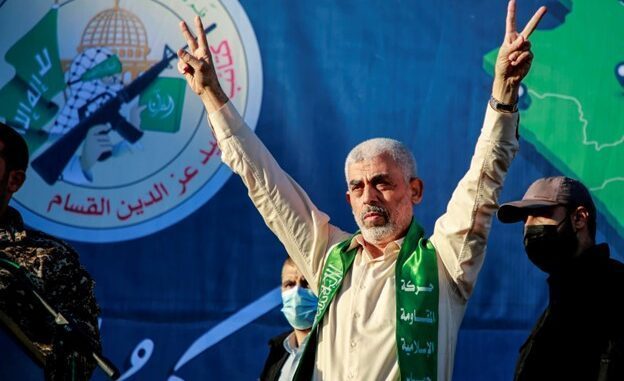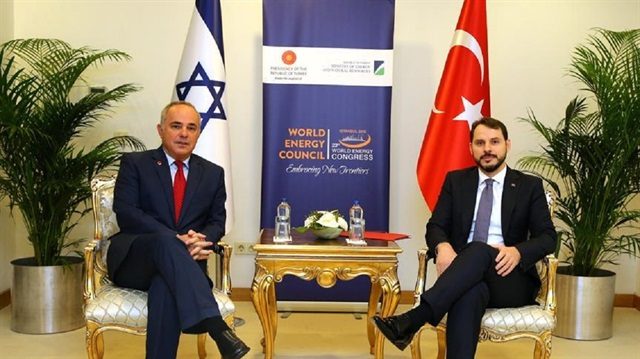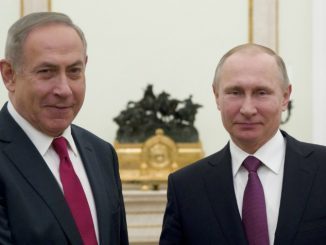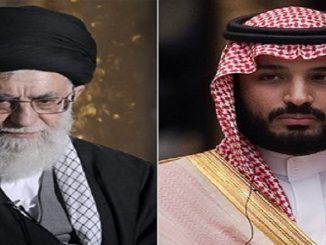
The next battle between Israel and Hamas will change the shape of the Middle East, Hamas Gaza leader Yehya Sinwar said on Saturday.
Addressing Palestinian academics in the Gaza Strip, Hamas’s Gaza leader Yehya Sinwar reiterated that Hamas had won the last round of fighting with Israel.
Sinwar confirmed that Israel had failed during the 11-day fighting to destroy “the capabilities of the Palestinian resistance,” adding that Israel destroyed less than 3% of Hamas’s tunnels during the fighting.
“Our people proved to the occupation and the rest of the world that our ummah (Muslim nation) is ready to defend al-Aqsa Mosque,” Sinwar said.
He praised the Palestinians in Jerusalem for resisting Israeli “schemes to Judaize Jerusalem, divide al-Aqsa Mosque and carry out ethnic cleansing.”
Sinwar denounced Arab countries and rulers who signed peace treaties with Israel. He also lashed out at the Palestinian Authority for conducting security coordination with Israel in the West Bank.
Sinwar listed various “strategic goals” that Hamas achieved during the military confrontation with Israel.
“First, we proved to the enemy that we are capable of protecting and defending al-Aqsa Mosque and that we are ready to pay a heavy price,” he said. “The uprising of our people in Jerusalem, the West Bank and the 1948 lands put pressure on the enemy more than the rockets of the resistance.”
Sinwar said that the demonstrations near the border with Jordan and Lebanon during the Israeli attack on Gaza “sent a message to the enemy that it must not be deceived by what it hears from the [Arab] rulers who normalized their relations with Israel that ‘the ummah is finished and has collapsed.’”
Hamas’s second achievement, Sinwar noted, was that it managed to “thwart” Israel’s ostensible plan “to divide al-Aqsa Mosque in time and space” between Muslims and Jews.
Sinwar said the third achievement Hamas scored was that it succeeded in rallying Palestinians behind the “resistance.”
“We humiliated Tel Aviv,” the Hamas leader boasted, referring to the rockets and missiles that were fired at the city during the Israeli attack on Gaza. “We turned Tel Aviv into a mop.”
Sinwar said that Hamas’s strategic goal was to “break the pride of this criminal and arrogant enemy.” He scoffed at Israel for building a 70-m-deep wall along the border with the Gaza Strip, adding: “What kind of a state is this that has to build such a wall? Israel is thousands of times weaker than the home of a spider. Israel is a weak, shaky state.”
The Hamas leader said that the last round of fighting with Israel represented only a “small battle” and that the next war will be more significant.
Addressing the PA, Sinwar called on its leaders not to expect anything from the US administration. He said that the only way for the Palestinians to achieve their goals was through unity and a “popular resistance backed by an armed resistance.”
According to Sinwar, some Arabs and Muslims are “generously supporting the resistance” without revealing their identities.
Hamas to break cease-fire if Israel evicts Palestinian families
Sinwar last Thursday described the recent cease-fire between Palestinian resistance groups and Israel as “fragile.”
The attitude of the Tel Aviv administration will determine the future of the cease-fire, Yehya Sinwar told Anadolu Agency.
“If the occupation state halts any future attacks on the Al-Aqsa Mosque, Jerusalem and our people there, the cease-fire will sustain,” Sinwar said.
“If the occupiers desecrate the Al-Aqsa Mosque again or force our people in the Sheikh Jarrah neighborhood to leave their homes — repeat what they did before, the cease-fire will be broken,” he warned.
Sinwar urged the international community to put pressure on the Tel Aviv administration to adhere to international law and to stop its attacks on Jerusalem, the Al-Aqsa Mosque and Palestinians.
Accusing Israel of committing new “massacres” and “crimes against humanity” during the latest onslaught, Sinwar said they are ready to make all kinds of sacrifices to protect Jerusalem and Al-Aqsa.
An Egyptian-brokered cease-fire between Palestinian resistance groups and Israel took effect last Friday, putting an end to 11 days of the worst cycle of fighting in years.
Since April 13, clashes erupted across the occupied territories because of Israeli attacks and restrictions on Palestinians in East Jerusalem and the Al-Aqsa Mosque, and an Israeli court’s decision to evict 12 Palestinian families from their homes in favor of Israeli settlers.
Tensions moved to Gaza on May 10, leading to a military confrontation between Israeli forces and Palestinian resistance groups where Israeli warplanes caused an unprecedented scale of destruction in the occupied territory.
At least 254 Palestinians were killed, including 66 children and 39 women, and more than 1,900 others injured in Israeli airstrikes on Gaza, according to Palestinian medics. At least 31 Palestinians were also killed in Israeli attacks in the occupied West Bank.
Thirteen Israelis were killed by Palestinian rocket fire from the Gaza Strip.
Jerusalem remains at the heart of the Israel-Palestine conflict, with Palestinians hoping East Jerusalem, now occupied by Israel, might eventually serve as capital of a future Palestinian state.
Al-Aqsa Mosque is the world’s third-holiest site for Muslims. Jews call the area the “Temple Mount,” claiming it was the site of two Jewish temples in ancient times.
Since 2003, Israel has allowed settlers into the compound almost on a daily basis.
Israel occupied East Jerusalem, where Al-Aqsa is located, during the 1967 Arab-Israeli War. It annexed the entire city in 1980 in a move never recognized by the international community.
Sinwar defies Gantz
Chief of Hamas Political Bureau in Gaza Yehya Sinwar last week defied Israeli Defense Minister Benny Gantz as he posed for the media, calling for Gantz to carry out his pledge to assassinate him.
After two separate meetings held on Thursday with foreign and local reporters in Gaza, a journalist asked Sinwar: “Why are you not afraid of Gantz’s threat to assassinate you?”
Sinwar answered: “I do not care about Israeli threats that they cannot fulfil. Anyway, I am speaking to you live and I will leave you after 20 minutes, will go home on foot and will ask my bodyguards to walk far away from me. Let Gantz carry out his pledge if he can.”
Following the meetings with the media, Sinwar left alone and went home on foot. Before going home, he wandered around Gaza and met people whose homes and shops were destroyed.



